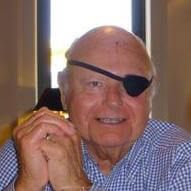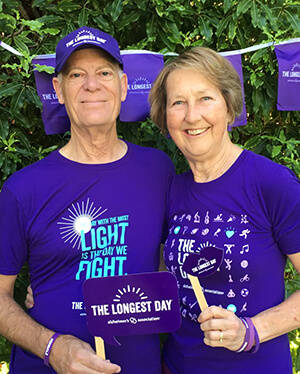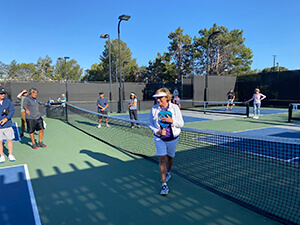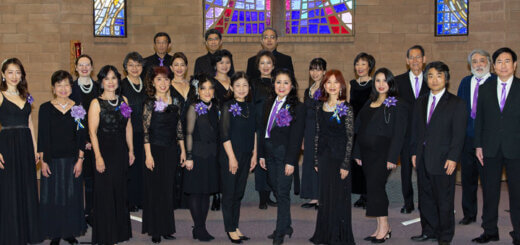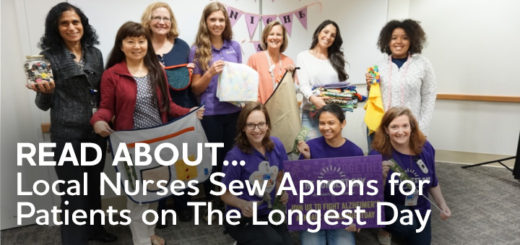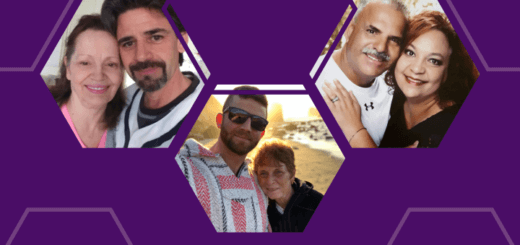Pickleball helps one woman heal grief and find a community
By Kerry Larkey, MSN, RN
Monie Wheatcroft TenBroeck wasn’t able to spend as much time as she wanted with her father during the last few months of his journey with Alzheimer’s disease. When her father died in 2016, she was already consumed by the loss of her husband, who had died from cancer only one week before. Eight years later, Monie found a way to work through the unprocessed grief from her father’s death by organizing a successful pickleball fundraiser for The Longest Day®. In celebration of April’s National Pickleball Month, Monie shares why the sport changed her life and how organizing the fundraiser helped bring closure.
The fundraiser’s inspiration: Gary’s Alzheimer’s journey
Monie remembers her father, Gary Wheatcroft, as a joyful and engaging man—the life of the party. A successful lawyer in Pasadena, he enjoyed spirited debates and drawing out those around him to discover what made them tick. One of his favorite activities was sitting at the game table, or “round table,” as he affectionately called it, and having vibrant, meaningful conversations with family and friends.
Like many people living with Alzheimer’s, memory loss wasn’t the first sign of the disease that Monie noticed in her father. Instead, she initially became concerned when she saw changes in his personality, one of the 10 Early Signs and Symptoms of dementia. Gradually, Gary’s mood changed, and he became less outgoing and withdrew socially. “That just wasn’t like my Dad,” Monie says.
Coping with two losses
As time passed, his symptoms progressed, leading to an eventual diagnosis of Alzheimer’s, making Gary one of the 6.9 million people in the United States living with dementia. In fact, according to the Alzheimer’s Association® 2024 Alzheimer’s Disease Facts and Figures report, dementia affects nearly 9% of men and 11% of all women older than 65 years.
Gary’s dementia progressed rapidly, and during the last few months of her father’s life, Monie wasn’t able to spend as much time with him as she would have liked. She felt overwhelmed by the death of her husband and father within one week and wasn’t able to fully grieve both losses at the same time. “I hadn’t processed my father’s loss,” Monie realized later.
Pickleball brings community and connection
In the years after her husband’s death, Monie searched for ways to build a healthy community of new friends. After struggling with periods of loneliness, she began playing pickleball, a sport similar to tennis, as a way to expand her social network. Monie immediately became obsessed with the sport. “I became addicted to that first sound of the ball hitting the paddle,” she says. “It triggered an athletic gene in me that lay dormant for 40 years.”
Playing pickleball also gave her the social companionship she’d been seeking. The friendships she’s formed through the game have given her a new group of people to spend time with, both on and off the court. “It’s brought a level of joy at this stage of my life that I didn’t think I’d ever have,” she adds. “As a widow, surrounding myself with a healthy lifestyle has been so life-affirming for me. It opened a whole new door.”
Bringing meaning to the game
In 2023 with the encouragement of dear friend and Alzheimer’s Board Member, Nancy Westcott, Monie decided to channel her passion for pickleball to raise awareness of Alzheimer’s by organizing a fundraiser for The Longest Day®. She saw this as an opportunity to honor her father in a meaningful way and work through her remaining grief.
As she began to plan, she discovered that fellow pickleball pal, Brian Abramson, had been deeply impacted by a loved one with Alzheimer’s. He was eager to come on board as co-captain. Together, they raised over $7,000, wildly exceeding Monie’s initial goal of $2,500.
Fundraiser attendance soars and the community grows
With the support of the Bay Club Redwood Shores, (the gym where she plays pickleball), management and a committee of member volunteers, Monie’s vision of an evening of open play on all four courts on the summer solstice came to life. She posted flyers throughout the club that included QR codes to make donations. She also promoted the campaign on Facebook, Instagram and LinkedIn and encouraged her network to share to their contacts.
All attendees were invited to play and join the friendly competition regardless of skill level. Everyone was encouraged to enjoy food and drinks. The turnout was so large that the scoring for each match was changed from 11 to 7, giving more people the opportunity to play. All attendees made donations, even though it wasn’t required, and in exchange, received a purple t-shirt for The Longest Day, a gift that Monie’s mother sponsored.
Education and connection
“Kicking off the event we were fortunate to hear a few words about the Alzheimer’s Association from Nancy Westcott and her husband Bart (The Longest Day Co-Chair) before they were off to their own ballroom dance fundraiser,” Monie recalls. Attendees had the opportunity to learn about dementia and bond over their own experiences related to the disease.
Part of the reason Monie thinks the fundraiser was such a success is that “It offered a chance for loose connections to form a bond and feel like they’re doing something for the greater good beyond pickleball.” She encourages others to take the leap and organize their own fundraisers for The Longest Day.
Tips for a successful fundraiser
Monie shares a few tips she learned along the way to those interested in organizing a fundraiser for The Longest Day. First, find out if your workplace offers charitable matching programs for both in-kind time and cash donations you make. “My employer at the time, encouraged employees to make an impact in their communities through donation matching,” said Monie. “[The company’s program], Dollars for Doers, is a program that encourages volunteerism with additional contributions based on hours of service.”
Second, use all of the Alzheimer’s Association’s online resources to help you organize an event. Monie used the tools to create a personal and team fundraising page to manage donations and promote the event. The website gives you access to template emails, educational information, planning ideas, and more.
Finally, prepare yourself to be pleasantly surprised. In the beginning, Monie didn’t know how successful the fundraiser would be. She started the event as a personal way to process the loss of her father, but in the end, the event had a larger impact on her entire community. “Give people the opportunity to contribute and you’ll be surprised,” she advises others. “The sweet surprise of seeing who shows up is very life-affirming.”
The Longest Day is the day with the most light – the summer solstice. Join Monie’s team, Pickleball Pals at the Bay Club and Beyond, or start your own at alz.org/thelongestday. Help us fight Alzheimer’s through a fundraising activity of your choice on a day that works for you. The funds you raise advance the care, support and research efforts of the Alzheimer’s Association.





